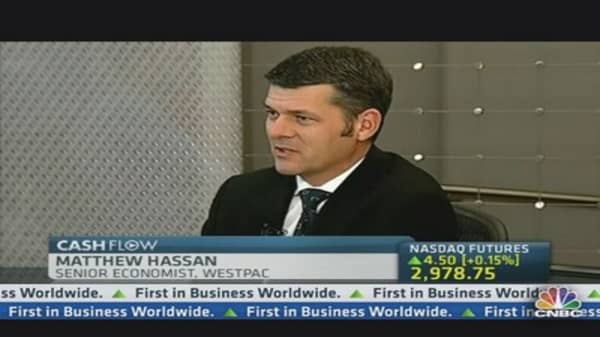Despite growing concerns that Australia is headed for a major downturn, economists argue that the "R" word for the country doesn't mean recession, but rather a rebalancing of the economy that it desperately needs.
Recent data out of Australia show a mixed picture of the economy as its major driver mining investment heads for an imminent peak.
For example, sales of new homes rose for a third straight month in May, according to a Housing Industry Association survey released last week, but another survey on Wednesday showed that consumer confidence remained cautious in July with sentiment edging lower from the previous month.
(Read More: What Bust? Australia Set for Huge Boom, Report Says)
But, HSBC economists say there are some early signs that Australia is rebalancing its economy from mining-led growth to growth from other sectors and the weak Australian dollar is going to help this transition.
"We remain optimistic that Australia will pull off its rebalancing, although growth is likely to be below trend this year at 2.5 percent, before heading towards trend next year at 2.8 percent," Paul Bloxham, chief economist for Australia and New Zealand at HSBC said in a note. "While a 'recession' can never be completely ruled out, we think Australia's R-word is more likely to be 'rebalancing.'"
HSBC's optimism is based on factors like Australia's main trading partner China still being among the world's fastest growing economies despite the current slowdown, the central bank's room to ease policy and the bulk of the domestic economy being outside of mining.
"As mining slows, we expect the other sectors, which account for around 80 percent of the economy, to take over as drivers of growth," Bloxham said. "The recent Australian dollar depreciation should help rebalance growth, as it makes the trade-exposed sectors more competitive."
(Read More: Australia Central Bank on Hold, Says Currency to Fall More)
The Australian dollar has fallen more than 11 percent this year against the greenback, and hit a session low of $0.916 on Wednesday after data showed weaker than anticipated Chinese exports in June.
"Key risks are a sharp fall in commodity prices, due to slower Asian growth, or a ramp-up in global commodity supply. However, we remain confident that local policymakers have room to loosen policy and the flexible Australian dollar could provide support in the face of a negative global surprise," Bloxham said.
The Reserve Bank of Australia kept interest rates unchanged at a record low of 2.75 percent last week, in line with market expectations that a weaker Australian dollar would prevent them from making a cut. But the central bank did maintain its easing bias, keeping the door open to further interest rate cuts to boost the economy if needed.
Key Jobs Data Ahead
Key June employment figures on Thursday could also paint a clearer picture of how the economy is coping despite the imminent peak in mining investment. But, economists remain split on which way the volatile data will go, as it has shown so far that almost 100,000 new jobs were created this year, but the unemployment rate has slowly ticked higher to 5.5 percent.
Bloxham is expecting a steady outlook with 15,000 jobs added in June from May, which he admits is a bit stronger than consensus.
(Read More: Australia's Growth Solution — More Australians)
"The labor market survey is very volatile, extremely difficult to predict and the broad story with what we have in mind is that the labor market is going to stabilize in coming months," Bloxham said.




